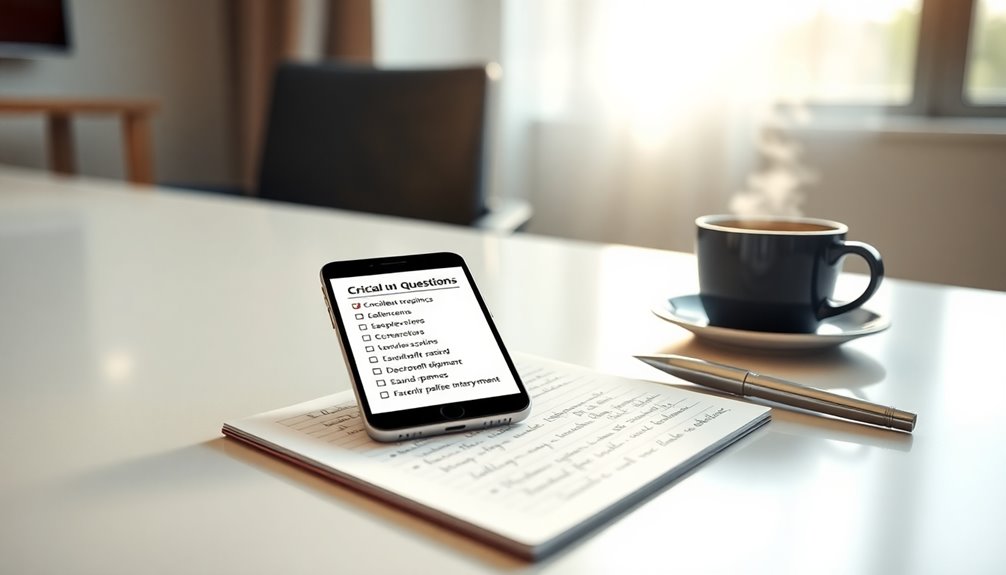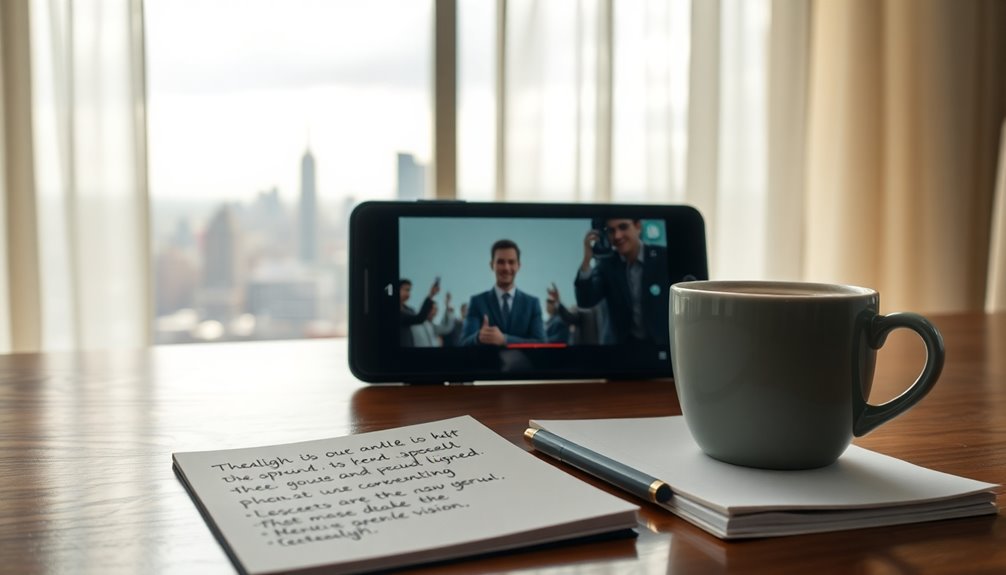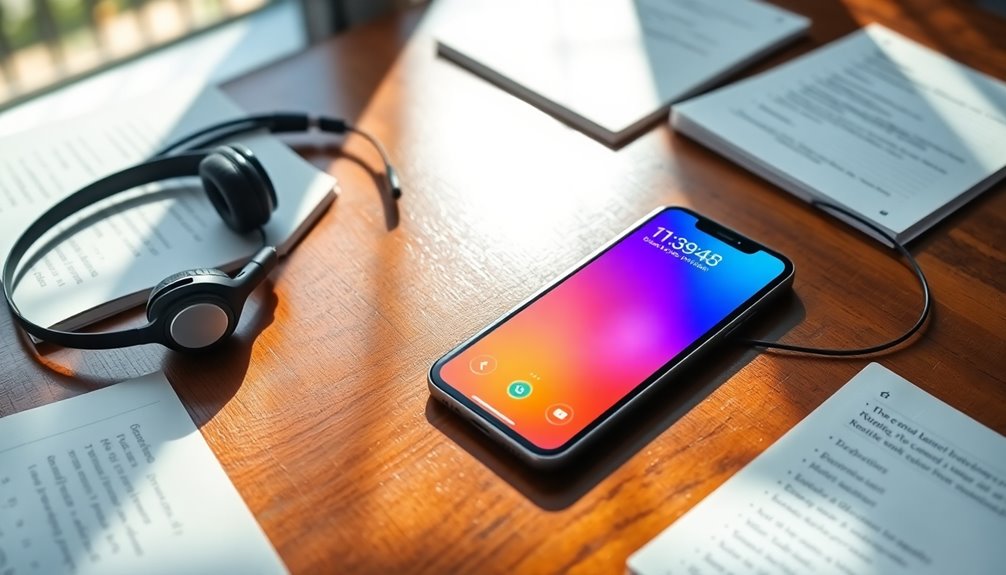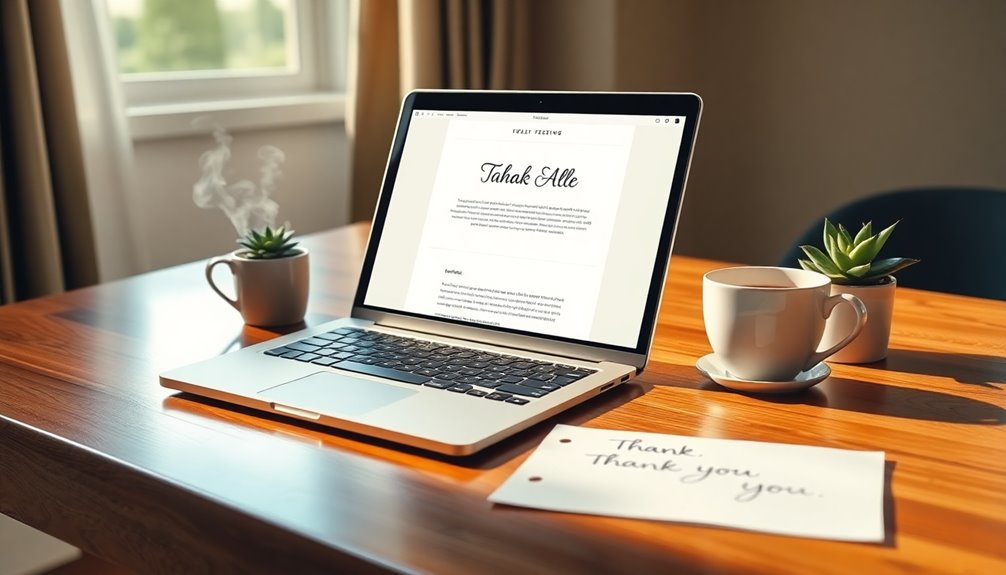To ace your phone interview, preparation is key. Start by researching the company's background and values to show genuine interest. Prepare answers for common questions and a few thoughtful inquiries about the role's day-to-day tasks, the company culture, and career growth opportunities. Asking about challenges current employees face can provide essential insights into the work environment. Always articulate your excitement about the position; this can set you apart. Remember, the right questions can demonstrate your alignment with the company's goals and culture. There's much more to discover about enhancing your interview approach.
Key Takeaways
- Prepare 2-3 open-ended questions about day-to-day tasks and role expectations to demonstrate interest and understanding of the position.
- Inquire about company culture to assess alignment with personal values and work style.
- Ask about career growth opportunities, including training and promotion paths, to evaluate long-term potential within the organization.
- Seek insights on challenges current employees face to gain a realistic perspective on the work environment.
- Clarify performance metrics and evaluation processes to ensure alignment with personal goals and expectations for success.
Importance of Preparation

When it comes to phone interviews, preparation is key to making a strong impression. You should approach the interview as a conversation, not an interrogation.
Research the company's background and values to show your genuine interest. Prepare answers to common interview questions and think of insightful questions to ask the interviewer. This illustrates your seriousness about the position and prevents any impression of disinterest.
Practicing your responses can boost your confidence and clarity, helping you communicate effectively. Even though it's a phone interview, dressing appropriately can mentally prepare you for the conversation.
Key Questions to Ask

Asking the right questions during a phone interview can greatly enhance your understanding of the role and the company. Focus on two to three open-ended questions that relate specifically to the position. This shows your genuine interest and helps you gauge if the role aligns with your career goals.
You might ask about the typical day-to-day tasks or clarify any ambiguities in the job posting. Prepare backup questions in case your primary ones are answered during the conversation.
Questions about company culture and opportunities for growth can also be insightful. Remember, your inquiries reflect your preparation and enthusiasm, so make them count!
Understanding the Role

Understanding the role you're applying for is crucial to ensuring it aligns with your skills and career aspirations. Before the interview, take the time to carefully review the job description. Identify key responsibilities and required skills to see how your experience fits.
Consider what excites you about the position and be ready to articulate that during the call. It's also essential to clarify any ambiguities in the job posting, especially regarding duties.
Prepare specific questions about day-to-day tasks and expectations to demonstrate your interest. This preparation not only boosts your confidence but also helps you decide if the role is the right fit for your career path.
Work Environment Insights

Gaining insights into the work environment is key to ensuring a good fit between you and the company. During your phone interview, ask questions that help you understand the company culture. Is it collaborative or more independent? You might inquire about how team members interact or share responsibilities.
Also, consider asking about the challenges current employees face in the role; this can reveal much about the work atmosphere. Don't forget to ask the interviewer about their personal experiences at the company. This can offer valuable perspectives on day-to-day life there.
Finally, seek clarification on performance metrics and evaluation processes; knowing how success is measured can help you gauge the environment's alignment with your own work style.
Career Growth Opportunities

While getting a clear picture of the work environment is essential, it's equally important to explore the potential for career growth within the organization.
Ask about the typical career path for someone in your role. You want to know how promotions work and what skills are valued for advancement.
Inquire about training opportunities or mentorship programs that support professional development. Understanding how the company fosters growth will help you assess if it aligns with your long-term goals.
Additionally, ask about the experiences of employees who've progressed within the organization. This insight can provide you with a clearer picture of what your future could look like, making it easier to decide if this is the right place for your career aspirations.
Company Vision and Stability

When you ask about a company's vision for the future, you're not just uncovering its goals; you're also evaluating its stability. Understanding where the company sees itself in five years can reveal its commitment to growth and adaptability.
Look for insights into how the business plans to navigate challenges and seize opportunities. You might ask about recent changes in strategy or how the company responded to industry shifts. This information helps you gauge if the organization is poised for long-term success.
Additionally, consider how the company's values align with your own. A strong vision rooted in stability often leads to a positive work environment and career growth, ensuring you're making a wise decision for your future. Furthermore, understanding the importance of advance directives can be crucial in evaluating how the company supports its employees during personal crises.
Follow-Up Strategies

Successful follow-up strategies can greatly enhance your chances of making a lasting impression after a phone interview.
Start by sending a thank-you email within 24 hours, expressing gratitude for the opportunity and reiterating your interest in the position. Be sure to mention specific points discussed during the interview to remind them of your conversation. This shows you're engaged and attentive.
In your email, you can also inquire about the next steps in the hiring process. Keep your communication professional and concise, avoiding overly casual language.
Finally, if you haven't heard back within the timeframe they provided, don't hesitate to follow up again politely. This indicates your enthusiasm and commitment to the role.
Frequently Asked Questions
What Should I Include in My Resume for This Role?
When you're crafting your resume for this role, focus on highlighting relevant skills and experiences that align with the job description.
Include quantifiable achievements to demonstrate your impact in previous positions. Tailor your summary to reflect your career goals and the company's values.
Don't forget to mention any certifications or training that apply.
Finally, make sure your resume is clear, concise, and free of errors to make a strong impression.
How Long Does the Interview Process Typically Take?
The interview process can feel like an eternity, but it usually takes anywhere from a couple of weeks to a month.
You'll likely have multiple stages, including phone screens and in-person interviews.
It's crucial to stay patient and proactive during this time. Don't hesitate to follow up; it shows your enthusiasm.
Each company's timeline can vary, so keep in mind that thorough evaluations can lead to better job fit for everyone involved.
What Are the Company's Core Values?
When you ask about the company's core values, it shows your interest in its culture and mission.
You're looking for insights into what drives the organization and how they align with your own values.
Understanding these values helps you gauge if the company is a good fit for you.
Listen carefully to the interviewer's response, as it reveals not just priorities, but also the environment you might be joining.
Who Will I Be Working With Directly?
Think of your future workplace like a team of musicians in an orchestra, each playing an essential role.
When you ask, "Who will I be working with directly?" you're tuning into the harmony of collaboration. This question lets you understand the dynamics of your potential team, revealing who you'll collaborate with and their roles.
It also shows your interest in teamwork, setting the stage for a successful relationship from the get-go.
Is Remote Work an Option for This Position?
You should definitely ask if remote work is an option for this position.
It's important to understand the company's stance on flexibility, especially in today's work environment. Knowing whether you can work remotely helps you gauge how it fits into your lifestyle.
If they offer remote work, you might want to ask about their policies on communication and team collaboration while working from home. This shows your interest in aligning with their work culture.
Conclusion
As you prepare for your phone interview, think of it as a dance—each question you ask is a step that leads to a deeper connection. By engaging thoughtfully, you not only showcase your interest but also illuminate the path toward a role that aligns with your career aspirations. Remember, this conversation is a two-way street, where both you and the interviewer explore the rhythm of potential collaboration. Step confidently, and let your curiosity guide you to success.









